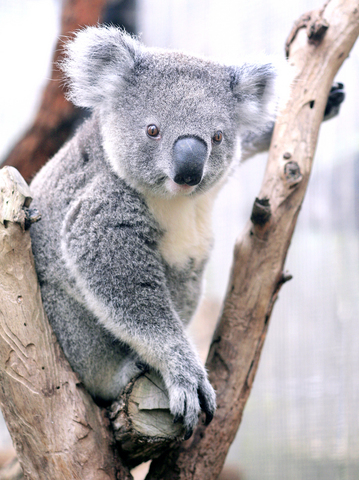ou may know koala bears for being the cute little animals that eat leaves all day and carry their babies in a pouch. In fact, koalas' scientific name means "ash-colored pouch bear."
But did you know that koalas are not actually bears at all? They are more closely related to kangaroos than they are to bears. Koalas spend most of their lives in trees. In fact, they don't even come down very often to drink water because the leaves they eat hold most of the water their bodies need.
Koalas are excellent tree climbers because they have sharp claws and an extra "thumb" that helps them hold on to trees. Did you know koalas even have fingerprints? They are the only animal besides humans and primates, like monkeys and chimpanzees, that do. (Kayleen Hartman, staff writer)

PHOTO : EPA
你或許知道無尾熊是終日食用樹葉、把寶寶放在育兒袋裡帶著走的可愛小動物。事實上,無尾熊學名的意思是「灰色的袋熊」。
不過,你知道無尾熊其實不是熊嗎?相較於熊類,牠們在血源上還比較接近袋鼠。無尾熊幾乎一輩子都待在樹上。事實上,由於無尾熊食用的樹葉含有牠們身體所需的大部分水分,牠們甚至很少下來喝水。
無尾熊爬樹的技藝高超,因為牠們除了有鋒利的爪子,還多了一根「姆指」,可以幫牠們牢牢抓緊樹木。你知道無尾熊甚至還有指紋嗎?無尾熊可是除了人類、猴子和黑猩猩等靈長類之外,唯一擁有指紋的動物。 (翻譯:賴美君)

Have you ever dreamed of hiking Taiwan’s majestic Mt. Jade or visiting Peru’s breathtaking Machu Picchu? These adventures sound amazing, but there’s something you should know about first: “altitude sickness.” This condition strikes when you climb to a higher elevation too quickly. The higher you go, the thinner the air becomes, making it harder for your body to absorb oxygen. The symptoms usually begin within hours of reaching high altitudes — about 2,500 meters or higher. You might experience headaches, dizziness, nausea, shortness of breath, or extreme fatigue. These symptoms can last for several days. The severity of altitude sickness varies

★ Bilingual Story is a fictionalized account. 雙語故事部分內容純屬虛構。 “Get in. It’s pouring.” She slid into the back seat, drenched and silent. “Tissues?” the driver asked. “No, thank you,” she said. Water beaded off her hair, ran from her coat, and made a small lake on the vinyl. She kept her head down, long black strands clinging to her face. “Where to?” She gave an address. “Funeral?” he asked as they slipped into the Xinhai Tunnel, rain fading to a hollow drum. She glanced up, puzzled. “No. Why?” “Crematorium’s about the only thing here.” He caught her eyes in the mirror.

A: In addition to boyband Energy’s concerts, Taiwan’s first major male dance revue has attracted attention. B: Several South Korean male dance revues and Australia’s Thunder from Down Under often tour Taiwan. Now Taiwan’s first all-male revue has finally appeared. A: According to the Liberty Times, Muscle High: A Male Dance Revue from Taiwan, featuring 13 hunks, opened last month and will run until Sept. 14. B: The rise of “hunk fever” in recent years has even caused a trend of working out in Asia. A: Let’s go to the Taipei Music Center’s Sub Livehouse for the show. A:

A: Any fun events happening this weekend? B: Boyband Energy’s concerts and Taiwan’s first major male dance revue have both sparked anticipation recently. A: Energy staged a comeback last year — 15 years after they disbanded — and they’re now more popular than ever. B: Their megahit “Friday Night” even won Song of the Year at the Golden Melody Awards. A: To pay tribute to the Queen of Pop Madonna, they added her choreography of 16 continuous jump squats to their music video, prompting a “16-squat challenge” that went viral across Taiwan. Do you wanna try it out? A: